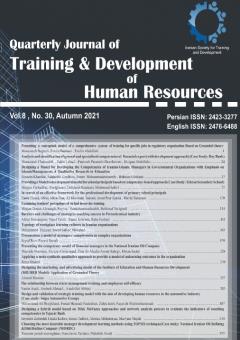Choosing the Most Desirable Manager Development Learning Methods Using TOPSIS Technique(Case study: National Iranian Oil Refining & Distribution Company (NIORDC)
Subject Areas : روش های نوین آموزش وتوسعه منابع انسانیYasamin Javadi 1 , Mahdieh Asadi 2 * , Hamidreza Yazdani 3
1 - National Iranian oil refining and distribution company
2 - Tehran University farabi paradis
3 - Tehran University
Keywords: learning, learning methods, learning dimensions, Development of managers, TOPSIS technique,
Abstract :
The present research was conducted to select desirable learning methods for managerial development based on effective criteria and dimensions using TOPSIS technique. Given the purpose, an applied method of research is used. To collect data, a survey descriptive method of research is used. The National Iranian Petroleum Refining and Distribution Company (NIORDC) was selected as the statistical population and 15 managers and experts in the field related to managers' learning and development were selected for interviews using purposive sampling. Data collection is performed using both library or documentary methods to review the literature and field study includes structured interviews, distribution and collection of the questioner. The validity of the questioner has been assessed and also approved by the experts due to its consistency with the literature. The reliability of the questioner has been approved by repeat testing. Best Worst method (BWM) as well as Expert choice software have been used for analyzing data and determining the coefficiency of influencing criteria of needs assessment methods and identification of their priorities. TOPSIS technique and Excel have been also used to determine Closeness Coefficient and the priority of each learning methods. Research Findings indicate that the game and simulation method is the most desirable learning method to implement the development programs of managers in the company.
1. اصغرپور، محمّدجواد (1385)، تصمیم¬گیری¬های چندمعیاره، چاپ چهارم، انتشارات دانشگاه تهران، تهران.#
2. بابایی زکلیکی، محمدعلی (1388)،"طراحی نظام جامع توسعه مدیران مجموعه مقالات سوّمین کنفرانس توسعه منابع انسانی"، تهران، مؤسسه مطالعات و بهره¬وری و منابع انسانی.#
3. حسینیان، شهامت و ربیع¬النجات، مجید (1392)، "بررسى روش¬هاى توسعه مدیران عملیاتى ناجا (رؤساى کلانترى¬هاى تهران بزرگ)، فصل¬نامه مطالعات مدیریت انتظامى، صص .156 – 174#
4. دراکر، پیتر (1391)، "چالش¬های مدیریت در سده بیست¬و¬یکم". تهران: خدمات فرهنگی رسا.#
5. زراعت¬کار، سمیه و همکاران (1395)، "شناسایی روش¬های یادگیری غیررسمی برای پرورش مدیران منابع انسانی در سازمان های بزرگ کشور"، مجله مدیریت فرهنگ سازمانی، دوره 14، شماره 2، صفحات 343 – 323.#
6. فتحی واجارگاه، کوروش و نوری، فیروز (1395)، "کتاب مدیریت یادگیری در سازمان¬ها"، انتشارات علم استادان.#
7. فرهی بوزنجانی، برزو (1386)،"معرفی اجمالی فرایندها و زمینه¬های یادگیری مدیریتی و روش¬های توسعه مدیران" مجله علوم انسانی، سال شانزدهم، شماره 69 ، صفحه 86-73. #
8. Alonderienė R. Enhancing informal learning to improve job satisfaction: Perspective of SMEs managers in Lithuania. baltic journal of management. 2010 May 18.#
9. Becker K, Bish A. Management development experiences and expectations: informal vs formal learning. Education+ Training. 2017 Jul 10.#
10. Carriger MS. What is the best way to develop new managers? Problem-based learning vs. lecture-based instruction. The International Journal of Management Education. 2016 Jul 1;14(2):92-101.#
11. Chivers G. Supporting informal learning by traders in investment banks. Journal of European Industrial Training. 2011 Mar 1.#
.12 CIPD. Learning and Talent Development Survey.#
13. Cullen J, Turnbull S. A meta-review of the management development literature. Human Resource Development Review. 2005 Sep;4(3):335-55.#
14. Cunningham J, Hillier E. Informal learning in the workplace: key activities and processes. Education+ Training. 2013 Feb 8.#
15. Dellana SA, Collins WH, West D. Cyber Dimensions: On-Line Education in a Management Science Course—Effectiveness and Performance Factors. Journal of Education for Business. 2000 Sep 1;76(1):43-7.#
16. Dreyfus SE. The five-stage model of adult skill acquisition. Bulletin of science, technology & society. 2004 Jun;24(3):177-81.#
17. Dunn DG. An analysis of informal learning in the 21 st century workplace (Doctoral dissertation, Capella University).#
18. Espedal B. Management development: Using internal or external resources in developing core competence. Human Resource Development Review. 2005 Jun;4(2):136-58.#
19. Gandelman RT, Santoro FM. Group Storytelling in Organizational Training. InIADIS International Conference on Information System 2010 Mar 18 (pp. 315-322).#
20. Kayes DC. Experiential learning and its critics: Preserving the role of experience in management learning and education. Academy of Management Learning & Education. 2002 Dec 1;1(2):137-49.#
21. Khan N, Tayal S, Khalique F. Understanding Management Development Techniques for Organization and Employee Growth: A Conceptual Study.#
22. Kolb DA. Experience as the source of learning and development prentice-hall. Englewood Cliffs. 1984:31-61.#
23. Lord RG, Hall RJ. Identity, deep structure and the development of leadership skill. The leadership quarterly. 2005 Aug 1;16(4):591-615.#
24. Meilin Y, Duo X. Research on the Human Resource Management Mode based on Competency Model. In2015 Conference on Informatization in Education, Management and Business (IEMB-15) 2015 Sep. Atlantis Press.#
25. Mezirow J. Learning to think like an adult. Learning as transformation: Critical perspectives on a theory in progress. 2000:3-3.#
26. Nwokah NG, Ahiauzu AI. Managerial competencies and marketing effectiveness in corporate organizations in Nigeria. Journal of management development. 2008 Aug 15.#
27. Pillania RK. State of organizational culture for knowledge management in Indian industry. Global Business Review. 2006 Feb;7(1):119-35.#
28. Rezaei J. Best-worst multi-criteria decision-making method. Omega. 2015 Jun 1;53:49-57.#
29. Wang J, Wang GG. Exploring national human resource development: A case of China management development in a transitioning context. Human Resource Development Review. 2006 Jun;5(2):176-201.#
30. Warhurst R. Role modelling in manager development: Learning that which cannot be taught. Journal of European Industrial Training. 2011 Nov 1.#
31. Yamazaki Y, Toyama M, Putranto AJ. Comparing managers’ and non-managers’ learning and competencies. Journal of Workplace Learning. 2018 May 14.#

